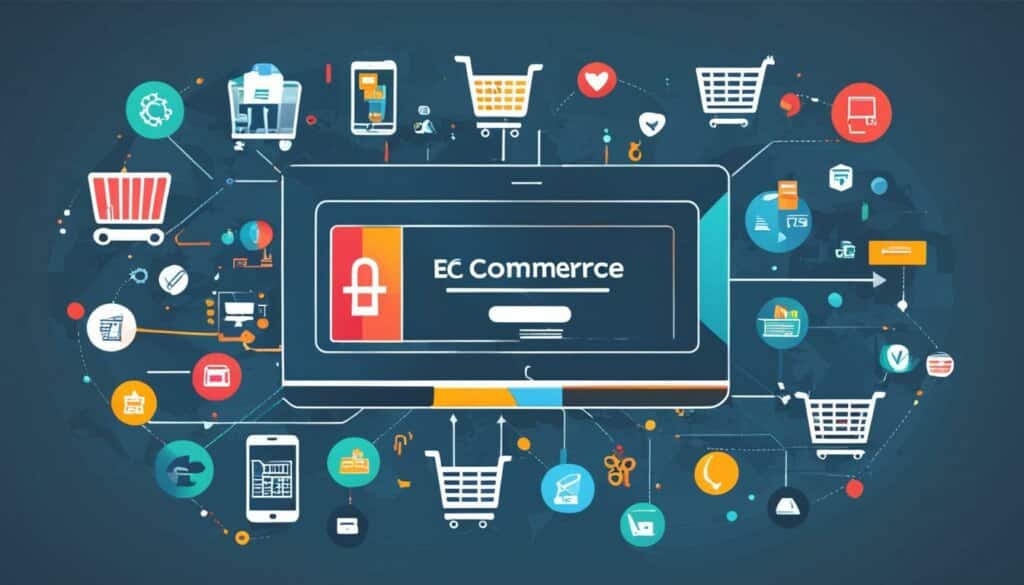Table of Contents
The e-commerce industry has revolutionized the way businesses operate, transforming the landscape of modern trade practices. With the rise of digital retail, businesses have tapped into the vast potential of online platforms to reach wider audiences, increase sales, and provide convenience to customers.
As more consumers embrace the benefits of e-commerce, the impact on traditional brick-and-mortar stores is undeniable. The convenience, competitive pricing, and wider range of products offered by e-commerce platforms have shifted consumer preferences towards digital retail.
The global e-commerce market is expected to reach a staggering $6.54 trillion by 2023, with a compound annual growth rate of 14.7%. This growth is fueled by advancements in technology, changing consumer behavior, and increased internet penetration. The e-commerce industry is reshaping business strategies and opening up new opportunities for entrepreneurs and established companies alike.
In this article, we will explore the future of the e-commerce industry, the significance of e-commerce platforms, the pillars of e-commerce success, market research tips before launch, and the key essentials for running a successful e-commerce business.
The Future of the E-Commerce Industry
The future of the e-commerce industry is shaped by emerging technologies that are revolutionizing the way businesses interact with consumers. These technologies, such as Artificial Intelligence (AI), Augmented Reality (AR), Virtual Reality (VR), Blockchain, and Internet of Things (IoT), are driving innovation and transforming the online shopping experience.
AI is being harnessed in the form of chatbots and virtual assistants to provide personalized recommendations and enhance customer service. These AI-powered tools analyze customer preferences and behavior to offer tailored suggestions, improving customer satisfaction and increasing sales.
AR and VR technologies are transforming the way customers engage with products online. By enabling virtual product visualization, customers can now see how items would look in their own homes or try on virtual clothing. This immersive experience bridges the gap between virtual and physical shopping, resulting in increased customer engagement and reduced product returns.
Blockchain technology is revolutionizing supply chain management in the e-commerce industry. Its decentralized, transparent, and secure nature allows for efficient tracking of products from manufacturer to consumer. With blockchain, businesses can ensure authenticity, traceability, and accountability, thus enhancing their customers’ trust.
IoT is paving the way for a highly personalized and interconnected e-commerce environment. Connected devices, such as smart home appliances and wearable technology, enable businesses to gather valuable data on customer behavior, preferences, and usage patterns. This data can be used to deliver personalized marketing campaigns, optimize product recommendations, and create exceptional customer experiences.
“The integration of emerging technologies like AI, AR, VR, Blockchain, and IoT into the e-commerce industry is redefining the way businesses operate and interact with customers. These technologies empower businesses to deliver personalized experiences, streamline operations, and build trust with customers.”
As the e-commerce industry continues to evolve, businesses that embrace emerging technologies will gain a competitive edge. By leveraging the power of AI, AR, VR, Blockchain, and IoT, businesses can enhance customer experience, optimize supply chain management, and drive growth in the digital marketplace.
https://www.youtube.com/watch?v=HlJUjAigjDk
| Emerging Technologies in E-Commerce | Benefits |
|---|---|
| Artificial Intelligence (AI) |
|
| Augmented Reality (AR) and Virtual Reality (VR) |
|
| Blockchain |
|
| Internet of Things (IoT) |
|
The integration of these emerging technologies in the e-commerce industry brings significant opportunities for businesses to innovate and thrive in the digital landscape. By staying ahead of these trends and harnessing their potential, e-commerce businesses can shape the future of online retail.
What are E-Commerce Platforms?
E-commerce platforms are software solutions that enable businesses to establish and manage their online presence effectively. These platforms offer a range of functionalities and benefits that are instrumental in driving the success of e-commerce businesses. By leveraging e-commerce platforms, businesses can streamline their operations and provide a seamless shopping experience to their customers.
One of the key functionalities of e-commerce platforms is storefront creation. These platforms provide businesses with the tools and templates to design visually appealing and user-friendly online stores. This ensures that businesses can showcase their products or services in an enticing manner, attracting and engaging their target audience.
Another crucial feature of e-commerce platforms is product catalog management. With these platforms, businesses can easily create and update their product listings, including high-quality images, detailed descriptions, and relevant specifications. This enables customers to make informed purchasing decisions and enhances the overall shopping experience.
E-commerce platforms also offer robust order management functionalities. They provide businesses with tools to efficiently process and fulfill customer orders, track shipments, and manage returns or exchanges. These streamlined processes contribute to customer satisfaction and loyalty.
Payment gateways integrated into e-commerce platforms enable businesses to offer a wide range of secure payment options, such as credit cards, digital wallets, or bank transfers. This gives customers the flexibility to choose their preferred payment method, increasing the likelihood of completing a purchase.
Marketing tools provided by e-commerce platforms allow businesses to implement various strategies to promote their products or services. These platforms often offer features like email marketing, SEO optimization, and social media integrations. This enables businesses to drive traffic to their online stores and reach a larger audience.
| Benefits of E-Commerce Platforms | Significance for Businesses |
|---|---|
| Easily expand reach to a global audience | Tap into the growing e-commerce market and increase sales potential |
| Reduce costs compared to traditional brick-and-mortar stores | Cost-effective solution for businesses, especially startups or small enterprises |
| Enhance customer experience with user-friendly interfaces | Provide seamless and convenient shopping experiences, leading to customer satisfaction |
| Gain valuable insights through analytics tools | Make data-driven decisions and optimize business strategies |
E-commerce platforms have revolutionized the way businesses operate in the digital age. The functionalities and benefits they offer have significantly impacted the success and growth of e-commerce businesses. By leveraging these platforms, businesses can establish a strong online presence, reach a wider audience, reduce costs, improve customer experience, and gain valuable insights to drive their business forward.

Testimonial:
“Using an e-commerce platform has been a game-changer for our business. It has allowed us to expand our reach, manage our online store efficiently, and provide a seamless shopping experience for our customers.”
– Julie Thompson, CEO of Thompson & Co.
The Pillars of E-Commerce Success
To succeed in e-commerce, businesses need to focus on several key pillars that contribute to their success. These pillars include:
- User-friendly website: A user-friendly website is essential for providing a seamless and enjoyable shopping experience. It should have fast-loading pages, intuitive navigation, and a visually appealing design. The website should be mobile-friendly to cater to the increasing number of users shopping on mobile devices.
- High-quality product listings: High-quality product listings are crucial for building trust with customers. They should include detailed descriptions and images that accurately represent the products. Clear and concise product information helps customers make informed purchasing decisions.
- Robust inventory management: Effective inventory management is vital to prevent stockouts and overstocking. It ensures that products are always available for customers to purchase, leading to increased customer satisfaction and sales. Implementing inventory management systems can streamline operations and minimize inventory-related challenges.
- Secure payment and shipping options: Offering secure payment options, such as encrypted payment gateways and trusted payment processors, instills confidence in customers. Additionally, providing flexible shipping choices, including multiple shipping carriers and reliable tracking, ensures a smooth and reliable delivery process.
- Customer support and communication: Exceptional customer support is crucial for resolving inquiries, concerns, and providing assistance throughout the shopping journey. This can be achieved through live chat, email support, or phone support. Clear communication regarding order updates, shipping details, and returns/refund policies is essential to keep customers informed and build trust.
Having these pillars in place establishes a strong foundation for e-commerce success. A user-friendly website, high-quality product listings, robust inventory management, secure payment and shipping options, along with exceptional customer support and communication, work together to create a positive and memorable shopping experience for customers.
| Pillar | Description |
|---|---|
| User-friendly website | A website that prioritizes ease of use, fast loading times, mobile responsiveness, and a secure checkout process. |
| High-quality product listings | Detailed descriptions, images, and accurate information that build trust with potential customers. |
| Robust inventory management | Efficient systems and processes to ensure optimal inventory levels, preventing stockouts and overstocking. |
| Secure payment and shipping options | Reliable and secure payment gateway options, along with flexible and efficient shipping choices. |
| Customer support and communication | Providing exceptional customer support and clear communication channels to address inquiries and concerns. |
Market Research Tips Before Launch
Before launching an e-commerce business, comprehensive market research is crucial for success. This process involves identifying the target audience and niche market, understanding their unique needs and preferences, and conducting a thorough competitive analysis to uncover gaps in the market. By engaging in in-depth keyword research, customer surveys, and implementing thoughtful pricing strategies, businesses can establish a solid foundation for their e-commerce venture. Additionally, gathering valuable feedback through a soft launch or beta testing phase can provide invaluable insights to optimize the business further.
Identifying the Target Audience and Niche Market
Market research begins with a deep understanding of the target audience and an identification of the niche market that your e-commerce business aims to serve. This entails researching demographic information, socio-economic factors, and consumer behavior patterns. By analyzing this data, you can create targeted marketing strategies and tailor your products or services to meet the specific needs of your audience.
Conducting Competitive Analysis
A thorough competitive analysis is essential to gain insights into the strategies and tactics employed by rivals in the industry. Examine direct and indirect competitors, analyzing their strengths, weaknesses, and unique selling points. This analysis helps identify key opportunities and potential gaps in the market that your e-commerce business can leverage.
Keyword Research for Effective SEO
Keyword research is a vital component of any successful e-commerce business. By identifying the keywords and search terms used by your target audience, you can optimize your website content and product descriptions to improve search engine rankings. This will increase the visibility of your e-commerce business and attract more organic traffic, ultimately leading to higher conversions and sales.
Customer Surveys for Actionable Insights
Direct feedback from your target audience is invaluable when it comes to developing products, improving user experience, and refining your overall business strategy. Conducting customer surveys allows you to gather qualitative and quantitative data, helping you identify pain points, preferences, and opportunities to better serve your customers. Utilize clear, concise surveys to maximize response rates and analyze the data collected to drive informed decision-making.
Thoughtful Pricing Strategies
Pricing plays a crucial role in attracting customers and maximizing profitability. Analyze the pricing strategies of your competitors and determine the optimal pricing structure for your products or services. Consider factors such as production costs, market demand, and perceived value. Offering competitive prices while maintaining profitability is key to capturing market share and building customer loyalty.
Gathering Feedback through Soft Launch or Beta Testing
Before a full-scale launch, consider conducting a soft launch or beta testing phase to gather feedback from a limited audience. This allows you to identify and address any potential issues, refine your processes, and make necessary improvements based on user feedback. By involving customers early on in the development process, you can create a product or service that better meets their needs and expectations.
Implementing these market research tips before launching your e-commerce business will provide a solid foundation for success. By understanding your audience, analyzing competitors, conducting keyword research, gathering customer insights, implementing thoughtful pricing strategies, and gathering feedback through soft launches or beta tests, you can position your business for growth and long-term success in the dynamic e-commerce landscape.

Conclusion
Establishing a successful e-commerce business requires attention to detail and careful planning. By focusing on the essentials discussed in this article and conducting thorough market research, businesses can lay a strong foundation for their ventures.
Market research plays a vital role in understanding customer preferences, identifying niche markets, and uncovering unique selling propositions. It enables businesses to adapt to changing trends and consumer demands, ensuring long-term success in the competitive digital marketplace.
Moreover, adaptability and continuous improvement are crucial for e-commerce businesses to stay ahead of the competition. The ever-evolving e-commerce landscape demands flexibility and innovation. Successful businesses continuously evaluate their strategies, optimize their websites, enhance the customer experience, and explore emerging technologies that can drive growth.
With dedication, the right strategy, and a commitment to continuous improvement, an e-commerce business can thrive and achieve long-term success. By incorporating the essentials of e-commerce, conducting thorough market research, and embracing adaptability, businesses can position themselves as leaders in the digital marketplace.
FAQ
What is e-commerce?
E-commerce, short for electronic commerce, refers to the buying and selling of goods and services over the internet.
Why is e-commerce important for businesses?
E-commerce offers businesses the opportunity to establish an online presence, expand their reach, reduce costs, enhance customer experience, and gain valuable insights.
What are some emerging technologies shaping the future of the e-commerce industry?
Some emerging technologies in the e-commerce industry include Artificial Intelligence (AI), Augmented Reality (AR), Virtual Reality (VR), Blockchain, and the Internet of Things (IoT).
How do e-commerce platforms help businesses?
E-commerce platforms provide businesses with features such as storefront creation, product catalog management, order management, payment gateways, and marketing tools.
What are the pillars of e-commerce success?
The pillars of e-commerce success include having a user-friendly website, high-quality product listings, robust inventory management, secure payment and shipping options, and exceptional customer support and communication.
Why is market research important before launching an e-commerce business?
Market research helps businesses identify their target audience and niche market, understand their needs and preferences, study competitors, and establish a solid foundation for their ventures.







